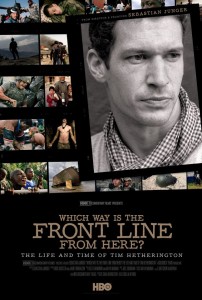“Now You’re a Soldier”
May 16, 2013 by Victoria Noe, in Friendship
, Grief
, HBO
, military
, Sebastian Junger
, Tim Hetherington
, Which Way is the Front Line From Here?
The moment came near the end of Which Way is the Front Line From Here? The Life and Times of Tim Hetherington. The HBO documentary, produced by his friend and fellow war correspondent Sebastian Junger, is a fascinating look into the world of embedded journalists. It’s all too obvious why dozens are killed every year.
After Hetherington’s death in April, 2011, Junger hears from one of the soldiers they lived with for 13 months in Afghanistan. The soldier tells him that he and Hetherington were accepted by the platoon, thought of (almost) as one of them. But, hoping he didn’t sound callous, the soldier told Junger that because he’d lost his friend, “now you’re a soldier.”
The next book in the Friend Grief series is about the military. Friend Grief and Community: Band of Friends. If community sounds like an odd word to describe war, it’s not.
The bond between soldiers on the front lines creates a world separate from that outside of the war zone. It creates an alternate universe, so different because of the inherent dangers. But it also creates a real community, where battle buddies eat, sleep, fight, laugh, cry and sometimes die together. It’s why they refer to each other as “brothers”. Calling each other “friend” doesn’t seem strong enough.
They share an experience that can’t really be explained to anyone not there, though I’ll do my best in the book. I expect to include military women as well, though their experience – being technically not “combat” – is different. Their grief is every bit as profound, although most do not watch their friends die.
Complicating this kind of grief is the reality of their situation. In the midst of battle, in a war zone, they have little if any opportunity to grieve their friends. Those feelings must be pushed aside for self-preservation and the good of the unit.
But eventually, often with tragic results, that grief will rise up again. Grief and guilt can fuel depression, addictions and even suicide.
Junger himself was searching for answers, to make sense of his friend’s death. He began interviewing people who were with Hetherington when he died. From those interviews grew this amazing documentary. If you haven’t seen it yet, I recommend it.
You’ll have a new appreciation of the people who put their lives on the line every day to protect us, and the journalists who tell their stories.


